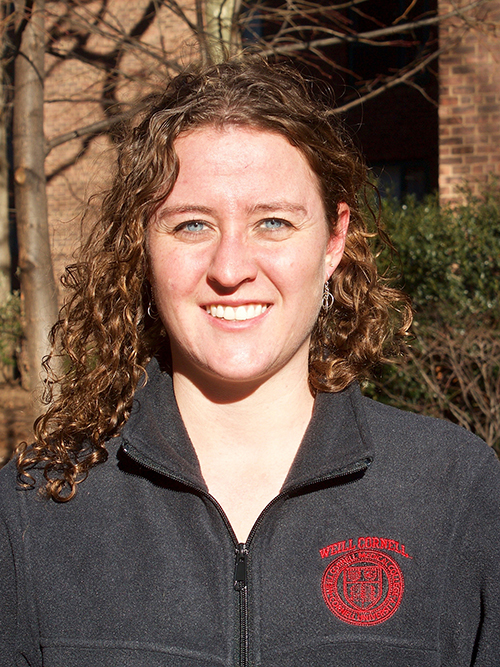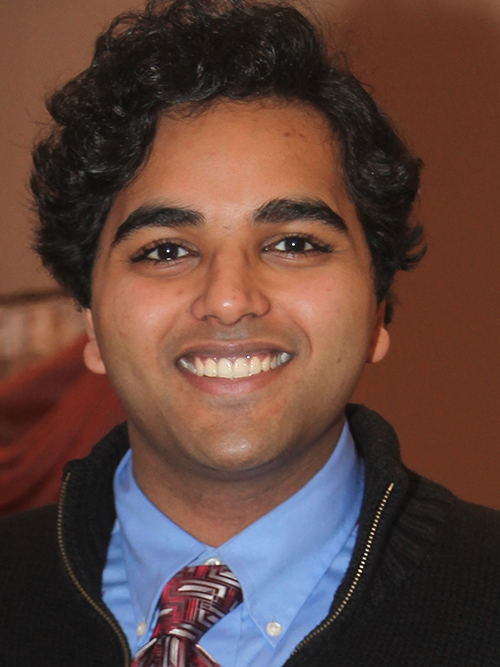Cornellians named to Forbes 30 under 30 list
By Timothy Malcolm


Weill Cornell Medicine doctoral candidates Kaitlyn Gayvert and Neel Madhukar have been named to Forbes magazine’s “30 Under 30” list, which lauds the successes of young change agents in 20 professional fields.
Gayvert and Madhukar, both enrolled in the computational biology and medicine program at Weill Cornell Medicine, were named as talents younger than 30 in healthcare nationwide. Forbes honored them for using big data algorithms to discover new anticancer drugs, predict drug-targeting mechanisms and address toxicity for drugs before reaching the clinical trial stage.
Both Gayvert and Madhukar said they are pleasantly surprised by the Forbes honor and are proud to know their lab work is being noticed on an international stage.
“It’s nice to have recognition for your work,” said Gayvert, a fourth-year doctoral student. “It truly is an honor to be named in the company of these other people who have accomplished so many great things with their work.”
Cornell alumni named to the Forbes list
Milagros Barsallo '09, co-founder, RISE Colorado (Education)
Michael Belkin '08, co-founder, Distinc.tt (Consumer Tech)
Morgan Beller '13, partner, Andreessen Horowitz (Venture Capital)
Jenna Bromberg '08, senior manager of digital engagement, Pizza Hut (Marketing & Advertising)
Scott Clark M.S. '11, Ph.D. '12, co-founder and CEO, SigOpt (Enterprise Tech)
Gabriel Dobbs '09, director of Business Development and Policy, Kespry (Law & Policy)
Narie Foster '09, co-founder, M.M. LaFleur (Retail & Commerce)
Dipayan Ghosh, M.Eng '12, Ph.D. '14, privacy and public policy adviser, Facebook (Law & Policy)
Alexander Lavin '12, research engineer, Numenta (Science)
Gayvert’s doctoral thesis adviser is Olivier Elemento, an associate professor of physiology and biophysics and of computational genomics in computational biomedicine at the HRH Prince Alwaleed Bin Talal Bin Abdulaziz Al-Saud Institute for Computational Biomedicine, and head of the computational biology group at the Caryl and Israel Englander Institute for Precision Medicine. Working with him, Gayvert has developed computational tools to predict drugs likely to perform well in clinical trials. She aims to reduce rising clinical trial attrition rates and what she called “skyrocketing” costs, which would ultimately reduce costs for pharmaceutical companies and, in the long run, cancer patients.
In his work in Elemento’s lab, Madhukar has developed a computational method to predict the mechanism of a drug by integrating numerous unrelated datasets to for determine a drug’s target, how it works and its effect.
The method, called BANDIT, has also discovered new potential cancer therapeutics and could help pharmaceutical companies develop drugs more efficiently.
"It's a huge honor," said Madhukar, a third-year doctoral student, of his Forbes recognition. "Sometimes people don’t think of science as cool or sexy, but it’s been amazing to see how many people are excited by what we are working on."
As part of the Englander Institute for Precision Medicine – which immerses researchers with molecular biologists and clinicians, allowing for an encompassing view of the effect of their discoveries – Gayvert and Madhukar see how the healthcare field is adapting to the new tools they’re developing.
“We’ve seen such approaches be successful in other biological problems. We’ve seen this way of looking at data work in the past,” Madhukar said. “It’s a great time to work on this project. Big data is there; it’s just waiting to be used.”
Timothy Malcolm is a freelance writer for Weill Cornell Medicine.
Media Contact
Get Cornell news delivered right to your inbox.
Subscribe